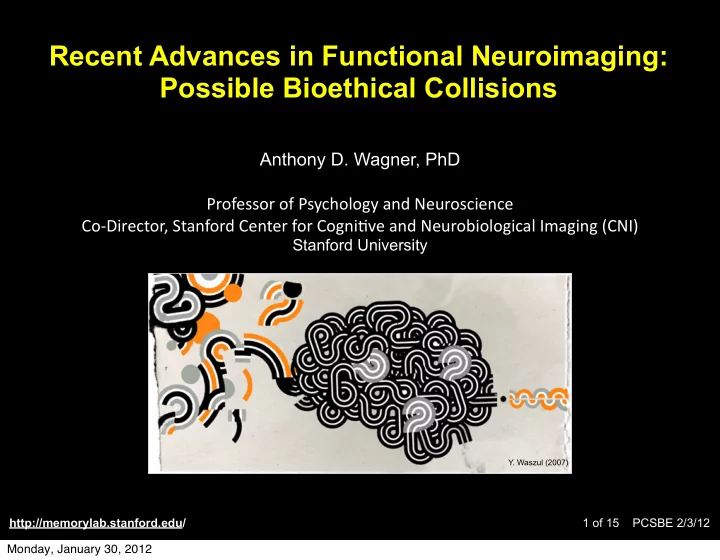

Recent Advances in Functional Neuroimaging: Possible Bioethical Collisions Anthony D. Wagner, PhD Professor ¡of ¡Psychology ¡and ¡Neuroscience Co-‑Director, ¡Stanford ¡Center ¡for ¡Cogni9ve ¡and ¡Neurobiological ¡Imaging ¡(CNI) Stanford University Y. Waszul (2007) http://memorylab.stanford.edu/ 1 of 15 PCSBE 2/3/12 Monday, January 30, 2012
Overview Functional vs. Structural Neuroimaging Detecting Mental States – Functional MRI-based Lie Detection – Functional MRI-based Memory Detection Detecting Consciousness: Diagnostic and Prognostic Utility Neuroprediction – Predicting Stress Responses in Soldiers – An Exemplar 2 of 15 PCSBE 2/3/12 Monday, January 30, 2012
Human Neuroimaging Structural – Measures of brain anatomy / tissue composition – e.g., Structural MRI; Diffusion Tensor Imaging Functional – Direct and indirect measures of brain activity – e.g., Functional MRI; PET; EEG 3 of 15 PCSBE 2/3/12 Monday, January 30, 2012
Overview Functional vs. Structural Neuroimaging Detecting Mental States – Functional MRI-based Lie Detection – Functional MRI-based Memory Detection Detecting Consciousness: Diagnostic and Prognostic Utility Neuroprediction – Predicting Stress Responses in Soldiers – An Exemplar 4 of 15 PCSBE 2/3/12 Monday, January 30, 2012
Functional MRI (fMRI) & Lie Detection 5 of 15 PCSBE 2/3/12 Monday, January 30, 2012
Analysis of fMRI Lie Detection Literature (Wagner (2010), In: A Judge ʼ s Guide to Neuroscience ) No relevant published data unambiguously answer whether fMRI- based neuroscience methods can detect lies at the individual- instance level. No relevant data on the sensitivity and specificity of fMRI-based lie detection. The Published Literature (circa May 2010) –– 32 peer-reviewed papers in total (28 unique data sets) • 21 exclusively report group-level data – cannot answer whether fMRI can detect individual lies • 11 report whether they can detect if an individual is “lying” – fundamental methodological limitations render these studies uninformative 6 of 15 PCSBE 2/3/12 Monday, January 30, 2012
“Memory Detection”: Mumbai, India 7 of 15 PCSBE 2/3/12 Monday, January 30, 2012
Can fMRI Detect Memories? Rissman, Greely, & Wagner (2010), PNAS 8 of 15 PCSBE 2/3/12 Monday, January 30, 2012
Can fMRI Detect Memories? Rissman, Greely, & Wagner (2010), PNAS 65% Hits ¡ vs. ¡ CRs 60% 8 of 15 PCSBE 2/3/12 Monday, January 30, 2012
Can fMRI Detect Memories? Initial Conclusions 1) Yes: Under highly-controlled conditions, fMRI can discriminate between whether someone is remembering or not with reasonably high accuracy. 2) Not well: Under highly-controlled conditions, fMRI poorly discriminates between true vs. false memory and poorly detects past experience when the subject fails to remember. 3) Source memory? Unclear whether fMRI can identify the source of a memory (e.g., participation in an event vs. learning of event from the media) 4) Countermeasures? Subject strategies may dramatically alter classifier success. 5) Complicating factors: Retention interval; Practice effects; Emotional significance; Motivation; Stress; Group effects (e.g., older adults or children) 9 of 15 PCSBE 2/3/12 Monday, January 30, 2012
Overview Functional vs. Structural Neuroimaging Detecting Mental States – Functional MRI-based Lie Detection – Functional MRI-based Memory Detection Detecting Consciousness: Diagnostic and Prognostic Utility Neuroprediction – Predicting Stress Responses in Soldiers – An Exemplar 10 of 15 PCSBE 2/3/12 Monday, January 30, 2012
Detecting Awareness: Disorders of Consciousness Owen et al. (2006) Science Cruse et al. (2012) Lancet 11 of 15 PCSBE 2/3/12 Monday, January 30, 2012
Overview Functional vs. Structural Neuroimaging Detecting Mental States – Functional MRI-based Lie Detection – Functional MRI-based Memory Detection Detecting Consciousness: Diagnostic and Prognostic Utility Neuroprediction – Predicting Stress Responses in Soldiers – An Exemplar 12 of 15 PCSBE 2/3/12 Monday, January 30, 2012
Neuroprediction in Soldiers: fMRI Data Pre-IDF Predict Stress Post-IDF Admon et al. (2009) PNAS 13 of 15 PCSBE 2/3/12 Monday, January 30, 2012
Neuroprediction in Soldiers: fMRI Data Pre-IDF Predict Stress Post-IDF Admon et al. (2009) PNAS 14 of 15 PCSBE 2/3/12 Monday, January 30, 2012
Overview Functional vs. Structural Neuroimaging Detecting Mental States – Functional MRI-based Lie Detection – Functional MRI-based Memory Detection Detecting Consciousness: Diagnostic and Prognostic Utility Neuroprediction – Predicting Stress Responses in Soldiers – An Exemplar 15 of 15 PCSBE 2/3/12 Monday, January 30, 2012
Recommend
More recommend